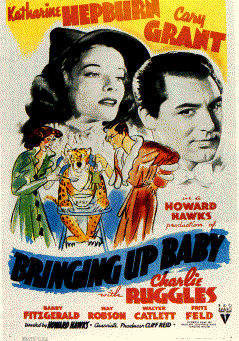Kerri Battles the AFI’s Top 100 — #88: Bringing Up Baby

I really thought we were in for a winner this week, folks. I figured I knew all I needed to know of the plot based on the movie poster: two immensely talented actors get mixed up in some crazy hijinks involving a big cat. It sounded like a recipe for some classic laughs. I’d been shown a clip or two in film school, too, and thought what’d I seen was funny. Plus, CARY GRANT. Who can’t watch 2 hours of Cary Grant in anything? I didn’t think anything could go wrong. It turns out everything could, including my understanding of the plot.
The man invented “devastatingly handsome.”
Cary Grant plays Dr. David Huxley, a zoologist who puts together brontosaurus skeletons. He has a frigid assistant/fiancee named Alice who insists upon no domestic entanglements within their marriage of any kind, including a honeymoon or children. She sees their marriage as a dedication to Huxley’s work and believes the brontosaurus skeleton will be their child. Katherine Hepburn plays Susan, a less than sane woman Huxley meets while attempting to woo a potential donor into giving $1 million dollars to his museum. After bickering bitterly for about 20 minutes, Susan apparently decides that Huxley is the only man she’s ever loved and determines to prevent his wedding the following afternoon. When Susan’s big-game-hunter-brother conveniently has a leopard delivered to her apartment, it’s the perfect excuse to ring the classically handsome zoologist and enlist his help/plot and scheme to prevent him from attending his own wedding at all. Countless misunderstandings, pratfalls, and illegal activities later, David and Susan are proclaiming their love for each other from atop the spine of a brontosaurus. Which then falls apart. Because of course it does.

This is literally how the movie ends.
The IMDb tagline for Bringing Up Baby reads, “While trying to secure a $1 million donation for his museum, a befuddled paleontologist is pursued by a flighty and often irritating heiress and her pet leopard ‘Baby.'” Whoever wrote this was employing a phenomenal amount of grace and tact. I happen to lack both of those qualities. If I had been asked to write the tagline, it would probably sound something more like, “A sociopathic heiress with an appalling lack of listening skills thinks it’s adorable to use anything within her power to prevent a man she hardly knows from marrying a woman she’s never met.” I may lack grace and tact, but Hepburn’s character lacks any redeeming qualities at all, and this fact essentially drives the entire plot. She’s arrogant, rude, and intentionally oppositional to everyone she meets. She talks over top of anyone speaking to her, adamantly refusing to hear reality. Some would argue that, by the standards of 1938, Susan was independent and strong. But, in 1938, the same would be said of a woman who dared to wear pants, so consider the source. By today’s standards, Susan would probably be a cast member on a Real Housewives franchise or the angler on an episode of Catfish. I gathered that I was intended to find Susan’s sense of entitlement and disregard for anyone but herself charming and whimsical. Instead, I found her loathsome and despicable, like a Kardashian who had been raised with impeccable manners. Per the Wiki, the part of Susan was based, to an extent, on Hepburn herself. I’m inclined to believe the more accurate explanation is that it’s based on the way Hepburn was perceived. Because a woman who wears pants and no make up on a Tuesday is obviously a crazy bitch, amirite?

Even if Suan could have been granted some sort of redemption, Bringing Up Baby would still be nearly unwatchable due to the simple fact that it is fucking dumb. Deciding to make a screwball comedy doesn’t preclude that story from being clever. The two don’t have to be mutually exclusive. Every joke in Bringing Up Baby, though, is infuriatingly, insultingly stupid. For example, early in the film, Huxley is trying to explain to Susan that she’s inadvertently gotten into his car instead of hers, an identical model parked next to his. Susan’s response is to chastise Huxley because THE PATRIARCHY and drive off like a madwoman with Huxley clinging desperately to the outside. These sorts of jokes are rehashed again and again, too, as though the audience is assumed to have some sort of learning disability that makes them incapable of getting an inane punchline the first time around. There’s the 5 minute scene where Susan refuses to listen to Huxley as he’s trying to tell her the entire back has torn off her dress. Or the 10 minute long dinner party scene where Susan has created an elaborate alias for Huxley but has failed to fill him in on the details. Or the 15 minute long torture where everyone gets arrested one by one because of a repetitive case of mistaken identity and a collective pride-fueled refusal to double-check who is actually at home when the police call. These people are all drooling morons and I fear for the fictional future of the fictional children the Huxleys are expected to have.

This lil guy is probably privileged compared to those Huxley kids I just made up.
Rocking a quick Wiki will tell you Bringing Up Baby was considered a flop at the box office and didn’t actually become popular until it started airing on television in the 50s. This sounds similar to the circumstances behind the meteoric rise to iconography of It’s a Wonderful Life: broadcast something inexpensive for enough years and, if you treat it like a beloved classic, the general public will, too. (Incidentally, It’s a Wonderful Life is also objectively terrible and also on The List; keep an eye out for that scathing review in like a year.) Because sometimes, if you watch something often enough, you start to like it just because you know it. Once, for an entire semester in college, my roommate and I could only study as long as Ever After starring Drew Barrymore was playing on a loop in the background. To this day, I will at least stop on the channel for a minute if I catch it on TV. And that movie is bad. I love it for sentimental inside joke reasons that don’t have to conflict with the fact that it’s bad. That doesn’t mean it would earn a spot on my official Top 100 movies of all time, if such a list were beyond the theoretical stage. I’m starting to suspect that the AFI might be less objective and more sentimental than they proclaim. –KS
